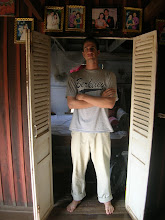High school here is completely different from high school in America. The students go to school from 7-11am in the morning, have a two-hour lunch break (because most of them go home for lunch, sometimes biking 10k roundtrip) and then study again from 1-5pm. Monday through Saturday. The first 15 minutes of every hour is a break. At school, the students stay in the same classroom all day. They all wear uniforms. It’s the teachers that rotate around to the different classes, and when they walk in all the students stand up to show respect. They also stand up whenever they answer a question or say anything in class. But having teachers rotate means that there are no science rooms or labs, the teachers can’t put anything up on the walls, and the same students are in every class together. Every classroom looks exactly the same. There are no honors classes and sometimes the gap in ability level – from strongest to weakest student – is tremendous.
There are, of course, challenges. Most classes have between 40 and 55 students. I can’t speak for other subjects, but in English class only about half the students have books, so they usually share with a partner. However, a lot of times we’re short on books and some students just have to get by without one. Another challenge is time. Cambodia has the most holidays of any country in the world, so it’s hard to have any consistency. For example, my school basically shut down for Chinese New Year, a 3-day break. And even Thursday and Friday only had about 75% attendance. Also, the teachers here are so poorly paid that every single one has other part-time jobs so they can earn enough money to live. This means that teaching at the public school is often a low priority, and if they have other things to do they just won’t show up.
Which brings me to my final point. Most teachers teach private lessons before or after school, or at lunch, or on the weekends. But only the students who can afford to pay for lessons (about 20 cents an hour) can go to these private sessions. All the students who can’t afford to go, or who are busy working in the rice fields in their spare time, or taking care of the house and their younger siblings, etc…… these students fall behind. So if you can’t afford private lessons you’re pretty much guaranteed to be behind the other students. My host sister, for example, studies about 20 hours a week in private lessons. That’s a lot of extra information.
Whoops, here’s the actual last point. There are no extracurricular activities. When I did a lesson about education in America the students were really curious about things like student government, yearbook, school newspaper, music, dance, etc. The only sport they play at my school is volleyball, and it’s not organized. The students don’t play against other schools; they just play when they have time.
Subscribe to:
Post Comments (Atom)









No comments:
Post a Comment